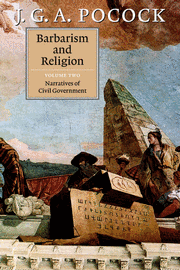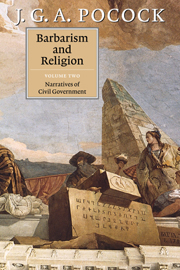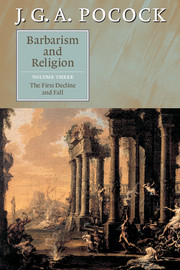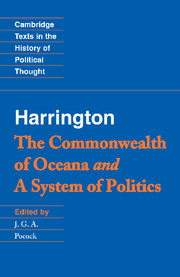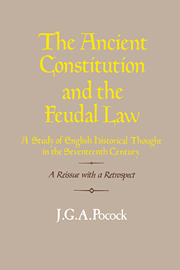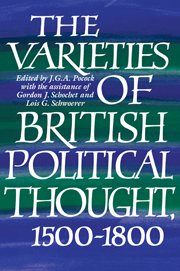Barbarism and Religion 2 Volume Hardback Set
Barbarism and Religion - Edward Gibbon's own phrase - is the title of an acclaimed sequence of works by John Pocock designed to situate Gibbon, and his Decline and Fall of the Roman Empire, in a series of contexts in the history of eighteenth-century Europe. This is a major intervention from one of the world's leading historians of ideas, challenging the idea of 'The Enlightenment' and positing instead a plurality of enlightenments, of which the English was one. Professor Pocock argues that the English Enlightenment of which Gibbon was part was an ecclesiastical as well as a secular phenomenon, one of several Protestant Enlightenments distinct from that of the Parisian philosophes, and part of the reconstitution of Europe after the wars against Louis XIV. The whole sequence is concerned less with the specific historiography of the Roman Empire than with the cultural history of Europe in the eighteenth century.
- The culmination of a life's work by one of the great historians of our time, writing about the greatest English historian of all time
- A major reinterpretation of one of the defining cultural moments in European history
- First-time paperback of a work that has already generated major review coverage (including NYTRB), and won a highly prestigious American prize in cultural history
Awards
Winner of the Jacques Barzun Prize in Cultural History of the American Philosophical Society
Reviews & endorsements
'Pocock manages to place Gibbon within these larger cosmopolitan movements without diminishing the historian's extraordinary accomplishment.' Tim Breen, New York Times Review of Books
'Pocock the historian of political thought has not been altogether useless to Pocock the historian of Gibbon's Roman Empire.' Peter Burke, European Legacy
'… the grandeur of Pocock's conception amazes, but it is often the asides and apercus that linger longest in the mind.' David Armitage, Lingua Franca
'Thus we come back to the English Protestant Enlightenment and the point from which John Pocock set out on his magnificent tour de force.' Nicholas Tyacke, The Times Literary Supplement
Product details
April 2001Multiple copy pack
9780521797610
790 pages
230 × 152 × 50 mm
1.25kg
Unavailable - out of print May 2005
Table of Contents
- Volume One: Introduction
- Part I. England and Switzerland, 1737–1763:
- 1. Putney, Oxford and the question of English Enlightenment
- 2. Lausanne and the Arminian Enlightenment
- 3. The re-education of young Gibbon: method, unbelief and the turn towards history
- 4. The Hampshire militia and the problems of modernity
- 5. Study in the camp: erudition and the search for a narrative
- Part II. The Encounter with Paris and the Defence of Erudition, 1761–1763:
- 6. The politics of scholarship in French and English Enlightenment
- 7. Erudition and Enlightenment in the Académie des Inscriptions
- 8. D'Alembert's Discours Preliminaire: the philosophe perception of history
- 9. The Essai sur l'Etude de la Litterature: imagination, irony and history
- 10. Paris and the gens de lettres: experience and recollection
- Part III. Lausanne and Rome: The Journey Towards a Subject, 1763–1765:
- 11. The return to Lausanne and the pursuit of erudition
- 12. The journey to Rome and the transformation of intentions
- Epilogue: Gibbon and the rhythm that was different
- Bibliographies
- Index. Volume II: Introduction
- Prelude: the varieties of early modern historiography: Part I. Constructing The Enlightened Narrative: Section I. Pietro Giannone: Jurist and Libertin in the Central Mediterranean
- 1. Civil and ecclesiastical history
- 2. Popes and emperors: from the Isaurians to the Hohenstaufen
- 3. Angevins, Spaniards and Gallicans: to the brink of enlightenment
- 4. Gibbon and Giannone: narrative, philosophy, erudition
- Section II. Voltaire: Neo-Classicst and Philosophe in the Enlightened World-Picture
- 1. On the horizons of Europe: the kings of the north
- 2. Courtly monarchy as the instrument of Englightenment: the Siecle de Louis XIV
- 3. Asia and the dechristianisation of history: the Siecle and the Essai sur les Moeurs
- 4. The Christian millennium in Europe: the Essai sur les Moeurs
- 5. The recovery of civil government, the rebirth of fanaticism, and the return to the Siecle
- 6. Voltaire: the exasperating predecessor
- Part II. The Historical Age and the Historical Nation
- Section III. David Hume and the Philosophical History of England
- 1. The problems of history in the Hanoverian Kingdoms
- 2. David Hume: the Essays as contemporary history
- 3. The History of Great Britain: Hume's modern history
- 4. England under the House of the Tudor: monarchy, Europe and enthusiasm
- 5. Hume's History of England: the Enlightened narrative in retrospect
- Section IV. William Robertson and the History of Europe
- 1. The problems of history: the Scottish perspective
- 2. Scotland and the progress of society
- 3. The Reign of Charles V and the emergence of the European States
- 4. Robertson: histories written and unwritten
- Part III. The Progress of Civil Society
- Section V. Adam Smith: Jurisprudence into History
- 1. Moral philosophy and the stages of society
- 2. Smith's Glasgow lectures: narrative and philosophical history
- Section IV. Adam Ferguson: the Moderate as Machiavellian
- 1. Ferguson's Essay: Siberia as the cradle of World history
- 2. The Memoires Litteraires and the Remains of Japhet
- 3. Scottish narrative: theoretical and civil history
- Part IV. Intending the Decline and Fall
- 1. The Enlightened narrative and the project of 1776
- 2. 'Gibbon's dark ages:' the writngs of 1765–72
- 3. Beginning to write: the evidence of hte autobiographies
- Bibliographies
- Index.


